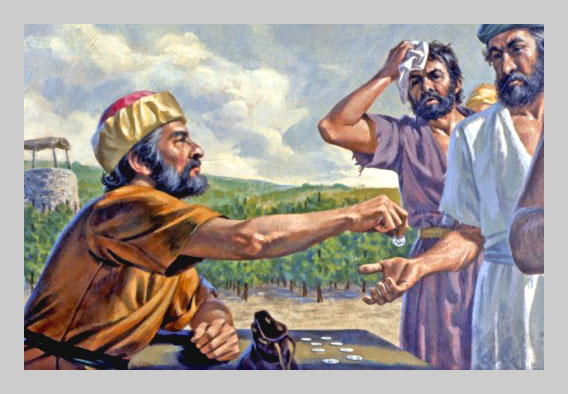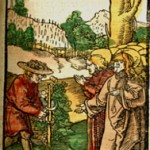 Previously, I wrote this same parable from the viewpoint of one of the laborers chosen in the last hour. This reflection will look at the key points that would have attracted the attention of the first century listener.
Previously, I wrote this same parable from the viewpoint of one of the laborers chosen in the last hour. This reflection will look at the key points that would have attracted the attention of the first century listener.
The beginning of the parable likened the kingdom of heaven to a landowner. We have no problem seeing the landowner in the parable as God, and rightly so. What a wonderful characterization of a loving, benevolent, merciful God.
The religious establishment who heard this parable spoken by Jesus would not have gotten this clear image. Those who owned land during the time of Jesus were the Sadducee priests or the Romans. The Roman’s had little interest in what Jesus said as long as he didn’t stir up trouble. The Sadducee’s, along with the Pharisee’s and scribes, who were already unified in their attempts to dishonor Jesus, would have heard this parable similarly.
In the opening statement, the kingdom of heaven is like a landowner, Jesus reiterated the belief that the priests had a direct connection to heaven. This would have had priests pricking their ears to listen, and maybe letting down their guard a bit.
The second part of the sentence where the landowner himself went to select workers would have left the religious leaders confused. Landowners turned the operation of their farms over to managers. To be involved in the menial task of hiring workers would threaten the honor of any landowner. Honor, or how their peers judged them, was the highest social value. The priests and other religious leaders would start to see the landowner in the parable as foolish to threaten his social status in this way.
Laborers would have gathered outside the city gates in a designated spot well known to both workers and managers. Jesus purposely and metaphorically misplaces the workers to put them inside the city, in the very heart of the marketplace. Day laborers had the lowest social status, while priests were near the top, only under kings and rulers. I expect in the metaphorical language of this parable, that the laborers left after the first pick were handicapped or defective in some way and would have no social status—they were outsiders.
Jesus’ landowner grew in his foolishness when in the next sentence, after agreeing with the laborers, the laborers have control of the wage negotiations. The Sadducees would have scoffed at this inept landowner who relinquished his power to laborers.
Most managers would have taken all the workers they needed early in the morning so that they would work the maximum hours. Any good manager would know the exact number of workers he needed and would have taken no more than necessary. Jesus’ landowner was different and grew more disorganized, scattered and foolish with his poor management skills when h e returned four more times to secure workers. Taking workers for just the last hour was beyond foolish, it was stupid. Jesus’ landowner did not measure up to priestly landowners.
e returned four more times to secure workers. Taking workers for just the last hour was beyond foolish, it was stupid. Jesus’ landowner did not measure up to priestly landowners.
It was also no mistake that the manager appears, only to call the laborers for their pay. It hinted that Jesus knew the social standards and played into the next scene where Jesus turned the social order upside down. The common practice was to address those of the highest status first. Paying the last workers first broke this honor code. I expect, when the priests heard that the ones who worked only a hour were paid first and given the same wage as those who had worked all day, were so angered that they shook their fists and dismissed Jesus as the ultimate fool.
~ ~ ~
Compare the ethics of this parable with present day management practices, what differences do you see? What is the normal response when a coworker gets a promotion or a pay raise and over another that seems more worthy? It is very human for the ego to become a vice, like the priests in this story who missed the point. Take some time to discern your own ego. Does it lean toward vise or virtue? What steps can be taken to move the ego forward on the virtue scale? God’s mercy is paramount in this story. He tried five times to save workers, how much more will God do for you? The early listeners saw God as a fool and missed the point of mercy that He gives to the late workers without consideration of their worthiness and at the same time was fair and just with the first workers He chose. Meditate on this image of the kingdom of heaven and then go out and dare to look foolish like this landowner.
bettyscheetz.com
Bringing First Century Christianity to Life
Welcome to my first blog, which I prefer to call “Reflections.” My posts will consist mostly of storytelling, as you will see below. My next blog will be more reflections on this story where I bring in some of the first century influences that add another layer of understanding to all of Scripture. Thank you for your consideration and time to read my blog. I look forward to hear from you. Go to my contact page.
Betty
The Parable of the Workers in the Vineyard.
A retelling of Matthew 20:1-16
I picture one of the laborers in this parable as young, slight of stature and dressed in a tattered tunic. It is possible he has a defect which would cast him into the lowest social status. The labor market in first century Jerusalem would have been dismal. Would he have a family? I think so, and that makes his plight all the more intense. I call him Samuel. So let’s take a look at the parable through the eyes of this young man. On the way to the market place, Samuel prayed that he would be chosen for work this day, as he did every day but the Sabbath. It was the season for dressing vines, and a greater need for workers. Samuel flexes his hand. If only he could afford the dressers knife, the landowners would look more favorably upon him. Samuel started to run until his limp tripped him up.
The first landowner arrived and pointed only to those men who carried their own tools. He looked past Samuel as if he didn’t exist. There will be others. Today was Samuel’s day.
The next landowner arrived. Samuel pulled himself up to stand tall and straight. Just as the landowner turned his way, other laborers shoved Samuel behind them. Time and again Samuel was overlooked. By mid morning, only a dozen men, Samuel among them, remained to wait in the hot sun with little hope of another landowner arriving to seek workers. Samuel could not face his wife and tell her to boil the same bone for soup that she had use all week. His children, with their sad, bulging eyes and thin limbs, wait for him to bring bread for their empty bellies. Samuel wanted to cry out, “Lord, why do you abandon me and my family? Do you hate me because I am not perfect?”
When the sun was highest in the sky, Samuel left his companions to wander the market place. He sniffed pungent spices and drooled over displays of fresh produce. His nose led him to a baker who had just pulled fresh bread from his oven. “Please sir, could you spare a loaf for my children? They are hungry for I have had no work this week.”
The merchant shook his fist. “Get lost you wretched bum!”
Samuel kicked at the dirt on the cobbled street toward the spot where landowners sought hirelings. His heart sank when he saw only five laborers left. Samuel ran to them. “Where did the others go?”
“The same landowner came and took six. We stepped away. Just as we returned, we saw them leave. We ran but were too late.”
Samuel’s legs folded under him, and he fell to the ground. He jabbed his elbows into his knees and dropped his head into his hands. His breaths came in jagged gasps. Even a few coppers for a few hours work would buy bread. He whispered under his breath, “Lord, where are you? Why do you not hear my prayers? No landowner will come at this late hour. I can’t go home. I can’t face my children.”
As the sun reached midway in the afternoon sky, Samuel left to fill his water skin. When he returned, only two men remained. When he heard the same landowner had returned and hired three more of the laborers, Samuel pounded his fist into his hand and mumbled to himself. “The Lord has no need for me or my children.”
Shadows lengthened toward evening. Samuel stood and began to pace. He would have to tell his wife and children he had failed, that they would be without food yet another day. He gulped to swallow his anger and disappointment and turned to pace the other direction. His heart leaped to see a man dressed in expensive robes walked toward Samuel and the other two unemployed men, the same landowner who had taken the other laborers.
“Why are you standing here idle all day?” the landowner asked.
“Because no one has hired us,” the three men said. Their eyes begged to the landowner.
“You also will go to work in my vineyard.”
Samuel pulled on his earlobe in disbelief. This man wants us to work in his vineyard at this late hour? Why? The wages would be minimal. Would it be enough to by a loaf of bread? It would be more than he had earned all week.
The workers already in the field eyed these three latecomers. Samuel shrugged away disdainful looks for the Lord had answered his prayers. Samuel trimmed vine after vine using his bare hands with great skill and speed to prove his worth to the landowner. The hour passed quickly. Too soon, the manager called the workers together to receive their pay. Samuel stayed at the back of the crowd. It would be disrespectful to move ahead of those who had worked all day.
The manager barked. “Those that came in last, come forward to receive your pay.”
Samuel, with is two companions, walked forward with their heads hung low. They dared not look at the others who deserved to be paid first. This unusual landowner went against customs. Samuel held out his hand, and the landowner dropped a coin into his palm. When Samuel held up his pay into the late sun light, the silver coin sparkled. He was certain his eyes deceived him—a denarius, pay for a full day’s work.
When others received the same pay, a grumble echoed through the workers picked first. “These last worked only one hour, and you have made them equal to us who have borne the burden of the day and the scorching heat.”
The landowner said, “Friend, I am doing you no wrong: did you not agree with me for the usual daily wage? Take what belongs to you and go; I choose to give to this last the same as I give to you. Am I not allowed to do what I choose with what belongs to me? Or are you envious because I am generous?”
Some things to think about:
Would you have been as persistent at this young man to wait when he knew there was little hope of finding work? How does this tie in with your faith, especially if your prayers seem to go unanswered?
How would you have reacted to the generous landowner?
Have you had an experience where someone was unexpectedly generous to you? How did it affect your own generosity to others?
©Betty Scheetz


